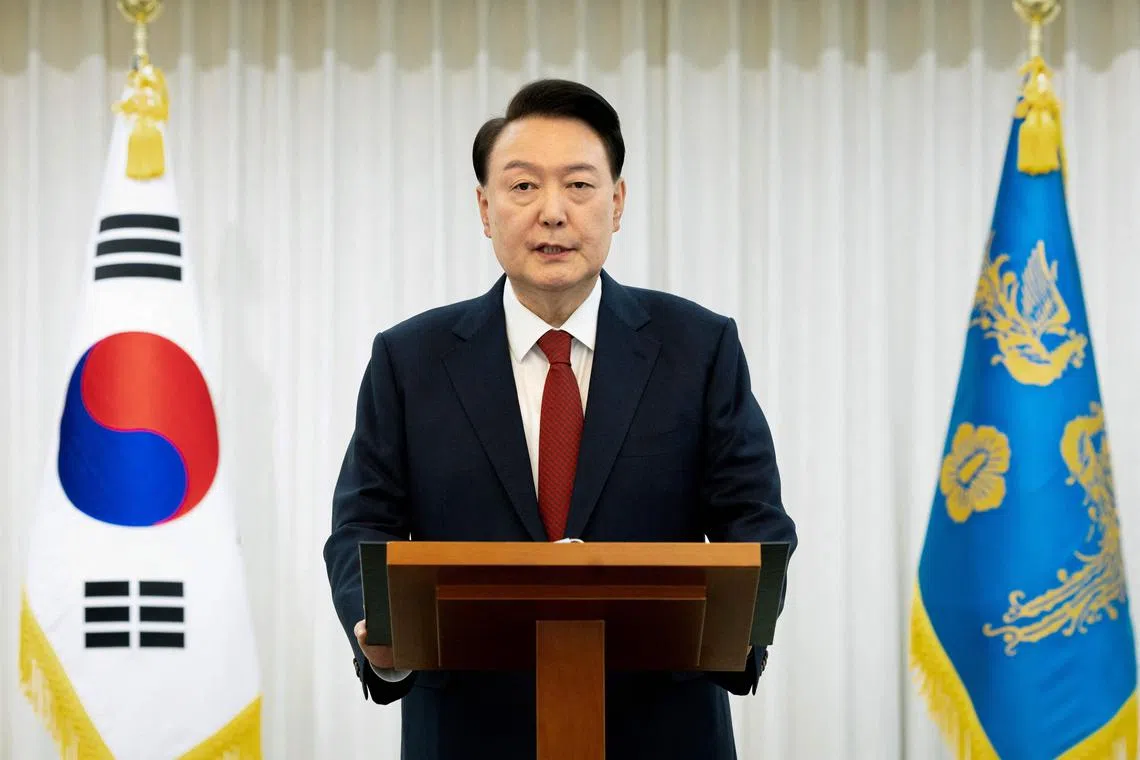The short-lived rise and fall of Yoon Suk Yeol
Sign up now: Get insights on Asia's fast-moving developments

South Korean President Yoon Suk Yeol gives a public address from his official residence in Seoul.
PHOTO: AFP
SEOUL - When Mr Yoon Suk Yeol, 63, won South Korea’s top job in 2022, some anticipated that he would heed the will of the people, tackle class inequality and build a country that could make everyone proud, as he vowed in his victory speech.
Yet, throughout the years, the conservative leader has fallen short.
Despite diplomatic initiatives that improved relations with Japan and the US, and bold moves to address the nation’s shortage of doctors in key areas, he could not stop his approval ratings from sliding to record lows. Criticism included his handling of policy agendas and controversies surrounding his wife
Sudden rise to stardom
Mr Yoon, who became the country’s third president to face impeachment
His remarks left an indelible mark on the public in a nation where prosecutorial bureaucracy is often politicised.
As his investigations primarily targeted corruption cases and went after some of the country’s influential figures, Mr Yoon’s achievements cemented him as an “anti-corruption investigator” who did not bend to any political pressure.
During his career, Mr Yoon entered the limelight for leading the prosecutions that jailed two former presidents, Ms Park Geun-hye and Mr Lee Myung-bak, as well as Samsung’s chief and a former chief justice of the country’s Supreme Court.
In particular, the year 2016 provided momentum for Mr Yoon. In December that year, he led a special investigation into a corruption scandal involving Ms Park. The probe was a historic development in Korean politics that resulted in Ms Park becoming the nation’s first democratically elected leader to be ousted from office.
In May 2017, then-president Moon Jae-in promoted Mr Yoon to lead the Seoul Central Prosecutors’ Office. Mr Yoon later rose through the ranks to serve as prosecutor general , one of the most powerful positions in the country’s legal system.
In 2019, Mr Yoon investigated then-justice minister Cho Kuk over corruption allegations involving his wife and children. Amid the struggle between Mr Yoon and Mr Cho, mass protests broke out in support of each side. In the end, Mr Cho stepped down, just 36 days after he accepted the post.
In the aftermath, the Moon administration tried several times to remove Mr Yoon, who also opposed its attempt to reform the prosecution, including curbing its investigative powers. Among other things, they accused him of inappropriate collusion with the media and illegal surveillance of judges.
Short road to presidency
Having fought with the administration for nearly two years, Mr Yoon resigned as top prosecutor in March 2019, with only four months left in his two-year term.
Three months later, Mr Yoon announced his bid for the presidency. He instantly won support from voters who sought a change of government from the liberal bloc amid a shortage of strong conservative candidates.
In July of the same year, the political neophyte joined the People Power Party (PPP), and in November, Mr Yoon became the party’s nominee for the presidential race after winning the party’s primary race.
Mr Yoon became the first former prosecutor to become president in South Korea in March 2022 by less than 1 percentage point. Mr Yoon garnered 48.6 per cent, against 47.8 per cent of Mr Lee Jae-myung, who is now leader of the main opposition Democratic Party of Korea.
Life before presidency
The prosecutor-turned-president was born in December 1960 to a pair of professors. His father Yoon Ki-jung was an emeritus professor at the nation’s prestigious Yonsei University, while his mother Choi Jeong-ja lectured at Ewha Womans University.
He graduated from Choongam High School and Seoul National University with an undergraduate degree in law. On his ninth try, he passed the state bar exam in 1991 and began his career as a prosecutor in 1994.
While he worked as a local prosecutor in Daejeon, Daegu and Gwangju, Mr Yoon used to frequent baseball games with his colleagues and refers to himself as an “avid baseball fan”. At the age of 51, he married Ms Kim, a businesswoman in the art industry, in 2012. Ms Kim is 12 years younger than Mr Yoon.
Mr Yoon Suk Yeol’s biography
Dec 18, 1960: Born in Seoul
1979: Graduates from Choongam High School
1983: Graduates from Seoul National University with an undergraduate degree in law
1991: Passes the state bar exam on his ninth try
1994 to 2001: Works as a prosecutor
2002: Works as an attorney for Bae, Kim & Lee
2003: Rejoins the prosecutors’ office
2008: Dispatched to Special Prosecutor’s Office to investigate crimes allegedly committed by the conservative Grand National Party’s presidential candidate
2009 to 2011: Works at Supreme Prosecutors Office
2012: Marries Ms Kim
2016: Leads special probe into a corruption scandal involving then-president Park
2017: Becomes chief of the Seoul Central Prosecutors’ Office
2019: Appointed prosecutor general
March 2021: Resigns in protest against the government’s prosecution reform plan
June 2021: Announces bid for the presidency
July 2021: Joins the main opposition PPP
Nov 2021: Becomes the presidential candidate of the PPP
March 2022: Wins presidential election. THE KOREA HERALD/ASIA NEWS NETWORK


